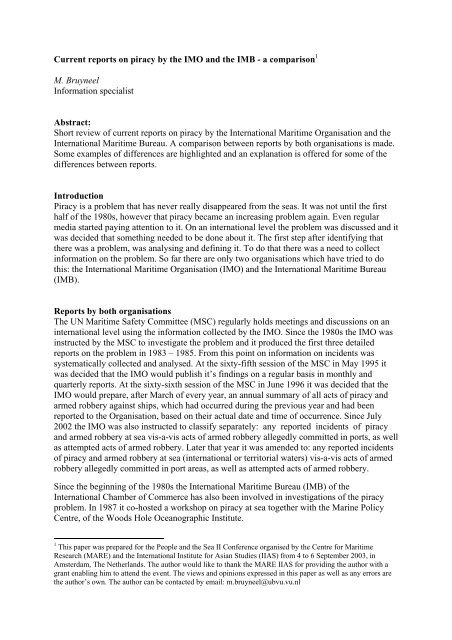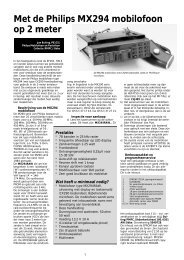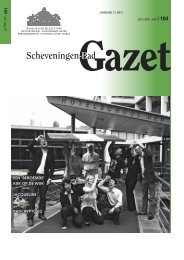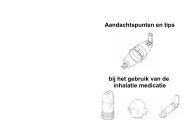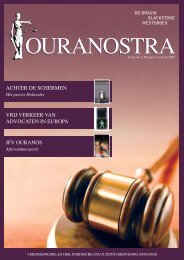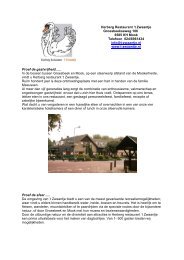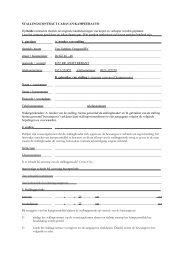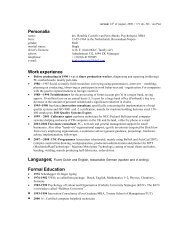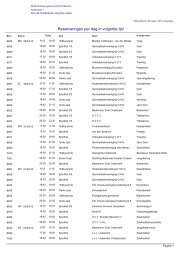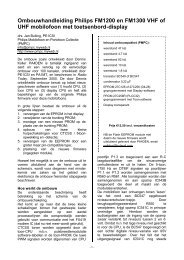Current reports on piracy by the IMO and the IMB - a comparison
Current reports on piracy by the IMO and the IMB - a comparison
Current reports on piracy by the IMO and the IMB - a comparison
Create successful ePaper yourself
Turn your PDF publications into a flip-book with our unique Google optimized e-Paper software.
<str<strong>on</strong>g>Current</str<strong>on</strong>g> <str<strong>on</strong>g>reports</str<strong>on</strong>g> <strong>on</strong> <strong>piracy</strong> <strong>by</strong> <strong>the</strong> <strong>IMO</strong> <strong>and</strong> <strong>the</strong> <strong>IMB</strong> - a comparis<strong>on</strong> 1<br />
M. Bruyneel<br />
Informati<strong>on</strong> specialist<br />
Abstract:<br />
Short review of current <str<strong>on</strong>g>reports</str<strong>on</strong>g> <strong>on</strong> <strong>piracy</strong> <strong>by</strong> <strong>the</strong> Internati<strong>on</strong>al Maritime Organisati<strong>on</strong> <strong>and</strong> <strong>the</strong><br />
Internati<strong>on</strong>al Maritime Bureau. A comparis<strong>on</strong> between <str<strong>on</strong>g>reports</str<strong>on</strong>g> <strong>by</strong> both organisati<strong>on</strong>s is made.<br />
Some examples of differences are highlighted <strong>and</strong> an explanati<strong>on</strong> is offered for some of <strong>the</strong><br />
differences between <str<strong>on</strong>g>reports</str<strong>on</strong>g>.<br />
Introducti<strong>on</strong><br />
Piracy is a problem that has never really disappeared from <strong>the</strong> seas. It was not until <strong>the</strong> first<br />
half of <strong>the</strong> 1980s, however that <strong>piracy</strong> became an increasing problem again. Even regular<br />
media started paying attenti<strong>on</strong> to it. On an internati<strong>on</strong>al level <strong>the</strong> problem was discussed <strong>and</strong> it<br />
was decided that something needed to be d<strong>on</strong>e about it. The first step after identifying that<br />
<strong>the</strong>re was a problem, was analysing <strong>and</strong> defining it. To do that <strong>the</strong>re was a need to collect<br />
informati<strong>on</strong> <strong>on</strong> <strong>the</strong> problem. So far <strong>the</strong>re are <strong>on</strong>ly two organisati<strong>on</strong>s which have tried to do<br />
this: <strong>the</strong> Internati<strong>on</strong>al Maritime Organisati<strong>on</strong> (<strong>IMO</strong>) <strong>and</strong> <strong>the</strong> Internati<strong>on</strong>al Maritime Bureau<br />
(<strong>IMB</strong>).<br />
Reports <strong>by</strong> both organisati<strong>on</strong>s<br />
The UN Maritime Safety Committee (MSC) regularly holds meetings <strong>and</strong> discussi<strong>on</strong>s <strong>on</strong> an<br />
internati<strong>on</strong>al level using <strong>the</strong> informati<strong>on</strong> collected <strong>by</strong> <strong>the</strong> <strong>IMO</strong>. Since <strong>the</strong> 1980s <strong>the</strong> <strong>IMO</strong> was<br />
instructed <strong>by</strong> <strong>the</strong> MSC to investigate <strong>the</strong> problem <strong>and</strong> it produced <strong>the</strong> first three detailed<br />
<str<strong>on</strong>g>reports</str<strong>on</strong>g> <strong>on</strong> <strong>the</strong> problem in 1983 – 1985. From this point <strong>on</strong> informati<strong>on</strong> <strong>on</strong> incidents was<br />
systematically collected <strong>and</strong> analysed. At <strong>the</strong> sixty-fifth sessi<strong>on</strong> of <strong>the</strong> MSC in May 1995 it<br />
was decided that <strong>the</strong> <strong>IMO</strong> would publish it’s findings <strong>on</strong> a regular basis in m<strong>on</strong>thly <strong>and</strong><br />
quarterly <str<strong>on</strong>g>reports</str<strong>on</strong>g>. At <strong>the</strong> sixty-sixth sessi<strong>on</strong> of <strong>the</strong> MSC in June 1996 it was decided that <strong>the</strong><br />
<strong>IMO</strong> would prepare, after March of every year, an annual summary of all acts of <strong>piracy</strong> <strong>and</strong><br />
armed robbery against ships, which had occurred during <strong>the</strong> previous year <strong>and</strong> had been<br />
reported to <strong>the</strong> Organisati<strong>on</strong>, based <strong>on</strong> <strong>the</strong>ir actual date <strong>and</strong> time of occurrence. Since July<br />
2002 <strong>the</strong> <strong>IMO</strong> was also instructed to classify separately: any reported incidents of <strong>piracy</strong><br />
<strong>and</strong> armed robbery at sea vis-a-vis acts of armed robbery allegedly committed in ports, as well<br />
as attempted acts of armed robbery. Later that year it was amended to: any reported incidents<br />
of <strong>piracy</strong> <strong>and</strong> armed robbery at sea (internati<strong>on</strong>al or territorial waters) vis-a-vis acts of armed<br />
robbery allegedly committed in port areas, as well as attempted acts of armed robbery.<br />
Since <strong>the</strong> beginning of <strong>the</strong> 1980s <strong>the</strong> Internati<strong>on</strong>al Maritime Bureau (<strong>IMB</strong>) of <strong>the</strong><br />
Internati<strong>on</strong>al Chamber of Commerce has also been involved in investigati<strong>on</strong>s of <strong>the</strong> <strong>piracy</strong><br />
problem. In 1987 it co-hosted a workshop <strong>on</strong> <strong>piracy</strong> at sea toge<strong>the</strong>r with <strong>the</strong> Marine Policy<br />
Centre, of <strong>the</strong> Woods Hole Oceanographic Institute.<br />
1 This paper was prepared for <strong>the</strong> People <strong>and</strong> <strong>the</strong> Sea II C<strong>on</strong>ference organised <strong>by</strong> <strong>the</strong> Centre for Maritime<br />
Research (MARE) <strong>and</strong> <strong>the</strong> Internati<strong>on</strong>al Institute for Asian Studies (IIAS) from 4 to 6 September 2003, in<br />
Amsterdam, The Ne<strong>the</strong>rl<strong>and</strong>s. The author would like to thank <strong>the</strong> MARE IIAS for providing <strong>the</strong> author with a<br />
grant enabling him to attend <strong>the</strong> event. The views <strong>and</strong> opini<strong>on</strong>s expressed in this paper as well as any errors are<br />
<strong>the</strong> author’s own. The author can be c<strong>on</strong>tacted <strong>by</strong> email: m.bruyneel@ubvu.vu.nl
In 1989 <strong>the</strong> <strong>IMB</strong> published <strong>the</strong> book Piracy at Sea which c<strong>on</strong>tains much details <strong>on</strong> reported<br />
<strong>piracy</strong> incidents. It was not until <strong>the</strong> establishment of <strong>the</strong> Piracy Reporting Centre (PRC) in<br />
1992, however, that <strong>the</strong> <strong>IMB</strong> started collecting <strong>and</strong> distributing informati<strong>on</strong> <strong>on</strong> <strong>piracy</strong> in a<br />
systematic way. Each year since it’s establishment <strong>the</strong> PRC has published quarterly <strong>and</strong><br />
annual <str<strong>on</strong>g>reports</str<strong>on</strong>g>. Over <strong>the</strong> years <strong>the</strong>se <str<strong>on</strong>g>reports</str<strong>on</strong>g> have come to c<strong>on</strong>tain more details <strong>on</strong> specific<br />
<strong>piracy</strong> incidents as well as a detailed analysis of trends.<br />
Informati<strong>on</strong> collected<br />
With a lot of help <strong>and</strong> kind assistance of people at <strong>the</strong> <strong>IMO</strong> <strong>and</strong> <strong>IMB</strong> I have managed to<br />
ga<strong>the</strong>r as much informati<strong>on</strong> as possible <strong>on</strong> <strong>the</strong> reported incidents reported <strong>by</strong> both<br />
organisati<strong>on</strong>s. Over <strong>the</strong> past few years I have put <strong>the</strong> details of <strong>the</strong> reported incidents in a<br />
database <strong>and</strong> using this database I have tried to match all reported incidents from both<br />
organisati<strong>on</strong>s. An analysis of incidents is not easy because occasi<strong>on</strong>ally dates are not quite <strong>the</strong><br />
same or details of ships involved in <strong>the</strong> incidents do not completely match. For a detailed<br />
comparis<strong>on</strong> it is not possible to use <strong>the</strong> m<strong>on</strong>thly <str<strong>on</strong>g>reports</str<strong>on</strong>g> of <strong>the</strong> <strong>IMO</strong> since <strong>on</strong> occasi<strong>on</strong> <strong>the</strong><br />
reported incidents are excluded from <strong>the</strong> annual report. The reas<strong>on</strong> is that some initial<br />
reported incidents eventually do not turn out to be actual attempts or acts of <strong>piracy</strong>. For <strong>the</strong><br />
same reas<strong>on</strong> <strong>the</strong> weekly <strong>piracy</strong> <str<strong>on</strong>g>reports</str<strong>on</strong>g> as well as <strong>the</strong> quarterly <str<strong>on</strong>g>reports</str<strong>on</strong>g> <strong>by</strong> <strong>the</strong> <strong>IMB</strong> can not be<br />
used.<br />
Comparis<strong>on</strong><br />
A detailed comparis<strong>on</strong> <strong>and</strong> analysis of reported incidents <strong>by</strong> <strong>the</strong> <strong>IMO</strong> <strong>and</strong> <strong>the</strong> <strong>IMB</strong> can<br />
<strong>the</strong>refore <strong>on</strong>ly be made <strong>by</strong> comparing those reported in <strong>the</strong> annual <str<strong>on</strong>g>reports</str<strong>on</strong>g>. So far I have<br />
managed to collect <strong>on</strong>ly some of <strong>the</strong> annual <str<strong>on</strong>g>reports</str<strong>on</strong>g> from both organisati<strong>on</strong>s. That is why <strong>the</strong><br />
comparis<strong>on</strong> in this paper is limited to <strong>the</strong> annual <str<strong>on</strong>g>reports</str<strong>on</strong>g> <strong>on</strong> <strong>the</strong> last 5 years: 1998 – 2002.<br />
Table 1 is a brief comparis<strong>on</strong> of 5 years which is made based <strong>on</strong> <strong>the</strong> reported totals:<br />
1998 1999 2000 2001 2002<br />
<strong>IMO</strong> 210 309 471 370 383<br />
<strong>IMB</strong> 2 192 285 469 335 370<br />
A more detailed analysis of <strong>the</strong> annual <str<strong>on</strong>g>reports</str<strong>on</strong>g> shows more differences in <strong>the</strong> <str<strong>on</strong>g>reports</str<strong>on</strong>g> for <strong>the</strong><br />
same years. Table 2 c<strong>on</strong>tains more informati<strong>on</strong> <strong>on</strong> specific differences:<br />
1998 1999 2000 2001 2002<br />
Reported <strong>by</strong> both <strong>IMB</strong> <strong>and</strong> <strong>IMO</strong> 182 277 456 323 357<br />
Reported <strong>by</strong> <strong>IMB</strong> <strong>on</strong>ly 9 6 13 12 13<br />
Reported <strong>by</strong> <strong>IMO</strong> <strong>on</strong>ly 28 27 15 43 26<br />
<strong>IMB</strong> annual report 3 191 283 469 335 370<br />
<strong>IMO</strong> annual report 3 210 304 471 366 383<br />
All incidents in annual <str<strong>on</strong>g>reports</str<strong>on</strong>g> 219 310 484 378 396<br />
2 The total number in later <strong>IMB</strong> annual <str<strong>on</strong>g>reports</str<strong>on</strong>g> for 1998 is 202, <strong>and</strong> <strong>the</strong> total number for 1999 is 300.<br />
3 The total number of reported incidents for a year is often slightly higher than <strong>the</strong> number of incidents <strong>on</strong> which<br />
full details are included in <strong>the</strong> annual report. That is why this row menti<strong>on</strong>s lower numbers than <strong>the</strong> total<br />
numbers of <strong>piracy</strong> incidents menti<strong>on</strong>ed in table 1.
From table 2 it is immediately obvious that most reported incidents are included in <strong>the</strong> annual<br />
<str<strong>on</strong>g>reports</str<strong>on</strong>g> of both organisati<strong>on</strong>s. Some incidents, however, are not included in <strong>the</strong> final total for<br />
<strong>the</strong> year.<br />
Table 3 shows some of <strong>the</strong> more obvious examples:<br />
Vessel name: Year <strong>IMB</strong> <strong>IMO</strong> Total<br />
Oxfordshire 1998 0 1 1<br />
Spar Emerald 1998 2 2 3<br />
Mihalis P. 1999 3 6 6<br />
Uni-Modest 1999 1 0 1<br />
Dutch C<strong>on</strong>crete 2000 0 1 1<br />
Actuaria 2000 1 0 1<br />
Actuaria 2001 2 4 5<br />
P&O Nedlloyd Everest 2001 0 1 1<br />
Hornestr<strong>and</strong> 2002 1 3 3<br />
Vostochnyy 2002 1 2 2<br />
Reas<strong>on</strong>s for variati<strong>on</strong>s include:<br />
! Some incidents are reported after <strong>the</strong> annual report was published <strong>and</strong> <strong>the</strong> details could<br />
not be included anymore. This is usually <strong>the</strong> case where <strong>the</strong> annual <str<strong>on</strong>g>reports</str<strong>on</strong>g> of <strong>the</strong> <strong>IMB</strong><br />
are c<strong>on</strong>cerned since <strong>the</strong>ir <str<strong>on</strong>g>reports</str<strong>on</strong>g> are published in January: it is a well known fact that<br />
some <strong>piracy</strong> incidents are reported <strong>by</strong> ship owners 1 or 2 m<strong>on</strong>ths after <strong>the</strong>y happen.<br />
The <strong>IMO</strong> annual <str<strong>on</strong>g>reports</str<strong>on</strong>g> appear in March of each year so <strong>the</strong>se <str<strong>on</strong>g>reports</str<strong>on</strong>g> are less affected<br />
<strong>by</strong> this reporting time lag<br />
! Differences in interpretati<strong>on</strong> of reported <strong>piracy</strong> incidents. Both organisati<strong>on</strong>s use <strong>the</strong>ir<br />
own definiti<strong>on</strong>s to determine whe<strong>the</strong>r an incident is really an act of <strong>piracy</strong> or armed<br />
robbery at sea<br />
! Differences in interpretati<strong>on</strong>s c<strong>on</strong>cerning individual <strong>piracy</strong> incidents: some <strong>piracy</strong><br />
attempts are heaped toge<strong>the</strong>r as a single incident <strong>by</strong> <strong>on</strong>e organisati<strong>on</strong> while <strong>the</strong> o<strong>the</strong>r<br />
organisati<strong>on</strong> c<strong>on</strong>siders <strong>the</strong>m to be separate acts/attempts<br />
! Problems with regard to <strong>the</strong> communicati<strong>on</strong> of reported incidents between both organisati<strong>on</strong>s.<br />
Despite close co-operati<strong>on</strong> <strong>the</strong>se may account for some differences. The<br />
graphic below shows that <strong>the</strong> differences in reported incidents have already become<br />
smaller in <strong>the</strong> past 7 years.<br />
Graphic 1: Piracy incidents reported from 1981 – 2002 4 .<br />
4 The numbers for this graphic are ga<strong>the</strong>red from annual <str<strong>on</strong>g>reports</str<strong>on</strong>g>, books, <strong>and</strong> journal or newspaper articles.
C<strong>on</strong>clusi<strong>on</strong><br />
If <strong>the</strong> <strong>piracy</strong> problem is ever to be analysed <strong>the</strong> collecti<strong>on</strong> of data is of <strong>the</strong> utmost importance.<br />
The <strong>IMO</strong> <strong>and</strong> <strong>the</strong> <strong>IMB</strong> have d<strong>on</strong>e an excellent job over <strong>the</strong> years since it is not easy to collect<br />
data <strong>on</strong> <strong>piracy</strong>. Many ship owners are reluctant to report attacks <strong>and</strong>/or attempts <strong>on</strong> <strong>the</strong>ir<br />
vessels because it might damage <strong>the</strong>ir reputati<strong>on</strong> <strong>and</strong> may bring extra costs if vessels are<br />
delayed during investigati<strong>on</strong>s. Knowing all details of <strong>piracy</strong> attacks <strong>and</strong> when a <strong>piracy</strong> report<br />
c<strong>on</strong>cerns an actual act or attempt will help fur<strong>the</strong>r scientific research into <strong>the</strong> problem.<br />
The first reas<strong>on</strong> for <strong>the</strong> difference in reported <strong>piracy</strong> attacks has to do with <strong>the</strong> 1 – 2 m<strong>on</strong>th<br />
time lag which may prevent <strong>the</strong> inclusi<strong>on</strong> in <strong>the</strong> annual <str<strong>on</strong>g>reports</str<strong>on</strong>g>. This external reas<strong>on</strong> for<br />
reported differences can be solved <strong>by</strong> issuing an additi<strong>on</strong>al supplement sometime after<br />
publicati<strong>on</strong> of <strong>the</strong> annual report.<br />
The o<strong>the</strong>r reas<strong>on</strong>s for differences of reported <strong>piracy</strong> incidents between both organisati<strong>on</strong>s are<br />
in part based <strong>on</strong> <strong>the</strong> fact that each collects informati<strong>on</strong> <strong>on</strong> it’s own <strong>and</strong> both interpret <strong>the</strong><br />
incidents based <strong>on</strong> different definiti<strong>on</strong>s. As far as I can determine from <str<strong>on</strong>g>reports</str<strong>on</strong>g> <strong>on</strong> statistical<br />
data <strong>by</strong> both organisati<strong>on</strong>s <strong>the</strong> differences have already become smaller since both<br />
organisati<strong>on</strong>s started co-operating. The graphic <strong>on</strong> <strong>the</strong> previous page clearly illustrates this.<br />
Closer co-operati<strong>on</strong> may still fur<strong>the</strong>r decrease <strong>the</strong> difference in <strong>the</strong> number of reported <strong>piracy</strong><br />
incidents. Especially if both organisati<strong>on</strong>s adopt a single definiti<strong>on</strong> or can agree <strong>on</strong> a similar<br />
interpretati<strong>on</strong> of <str<strong>on</strong>g>reports</str<strong>on</strong>g>. Ideally, setting up a single organisati<strong>on</strong> which collects informati<strong>on</strong><br />
<strong>on</strong> <strong>piracy</strong> incidents <strong>and</strong> <str<strong>on</strong>g>reports</str<strong>on</strong>g> to both <strong>the</strong> <strong>IMO</strong> <strong>and</strong> <strong>the</strong> <strong>IMB</strong>, can also solve this. A single<br />
database which can be shared between both organisati<strong>on</strong>s may also solve communicati<strong>on</strong><br />
problems.


